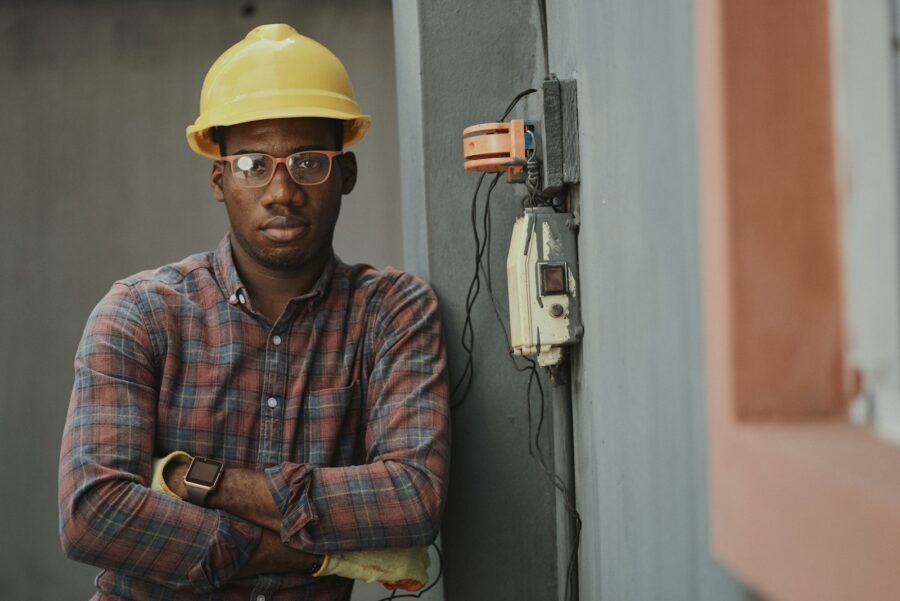In the fast-paced world of construction and trade, an often-overlooked topic lurks in the background: mental health. Despite significant advancements in workplace safety and employee welfare, mental health remains a largely unspoken issue, particularly in the construction and trade industries. This silence is not just deafening; it’s dangerous.
According to CIOB:
- Two people working in construction in the UK die by suicide every day. Over 700 per year.
- 48% have taken time off work owing to unmanageable stress.
- 91% have felt overwhelmed and 26% have expressed suicidal thoughts.
The construction industry, by its very nature, is one of the most physically demanding and mentally taxing fields. The long hours, the often precarious and high-risk work environments, and the intense pressure to meet deadlines and budget constraints contribute to an atmosphere where mental health struggles can easily take root. Yet, the industry is steeped in a culture that values toughness and resilience, sometimes at the expense of vulnerability and open dialogue about mental well-being.
Specialist contractors, the backbone of this industry, often bear the brunt of this silence. They are the skilled craftsmen and experts who ensure that the grand designs and architectural marvels we admire come to fruition. However, they have to navigate a maze of challenges that can take a toll on their mental health.
The Invisible Burden of Specialist Contractors
Specialist contractors face unique and, in my opinion, avoidable pressures that often go unrecognised. They are forced to operate in a highly competitive environment where job security is never guaranteed, and the pressure to underbid just to secure work is high. This financial uncertainty is compounded by the nature of the contracts they sign – which are far too often skewed in favour of main contractors and leave little room for negotiation or error.
This perceived imbalance in power dynamics often leads to late payments, unfair contract terms, and a systematic abuse of those who carry out work. The stress of managing these personal and professional uncertainties, coupled with the physical and mental demands of their work, creates a perfect storm for mental health struggles. Yet, the topic of mental health is rarely addressed openly in the industry.
I advocate for a fairer industry, where those who do the work are treated with respect, given reasonable terms, and paid fairly. I believe that the abuse perpetrated by the larger contractors causes a lot of the issues related to mental health in our industry and this needs to stop. I am tired of seeing so-called Tier 1 and other large contractors talking about how we ought to help our menfolk in the industry, whilst simultaneously causing a lot of the issues that lead to insolvencies and suicide.
Cultural Barriers and Stigma
The construction and trade industries have long been dominated by a ‘tough it out’ mentality. This machismo culture (85% of construction workers are male), where physical toughness is prized, often stigmatises discussions around mental health, albeit it is getting a lot better as more men are speaking up about their struggles, myself included. Admitting to struggling with mental health issues is often seen as a sign of weakness, a perception that could not be further from the truth. This stigma creates a barrier to seeking help, leading many to suffer in silence.
Additionally, the transient nature of construction work, with teams frequently changing as projects start and end, makes it difficult to develop a supportive community where workers feel safe to share their struggles. The lack of continuity in relationships and support systems only exacerbates the problem and many men are left feeling isolated.
I struggled with alcohol and drug issues for many years, due to childhood trauma that went untreated for much of my life. I felt ashamed and wanted to end my life in 2018, but now realise that those traumatic events led me to heal myself and now I seek to heal the industry that I love. It is why I work to protect specialist contractors from abuse because I know the impact of it and professionally witnessed my dad’s company being forced into insolvency due to clients refusing to pay their bills.
The Cost of Silence
The cost of not addressing mental health in the construction and trade industries goes beyond the devastating human cost. It impacts productivity, safety on site, and the overall quality of work. Mental health issues, if left unaddressed, can lead to increased absenteeism, high turnover rates, and a potential increase in serious accidents and errors on the job.
Furthermore, the ripple effect of mental health struggles extends to families and communities. It’s a highly pervasive issue that affects not just the individual but also those around them.
Breaking the Silence
So, what can be done to address this critical issue? It starts with leadership. Industry leaders need to recognise the importance of mental health and take proactive steps to create a culture where discussing mental health is not just accepted but encouraged.
It needs to be more than empty platitudes on a wall, or values that the company does not embody, it need positive action and honesty.
Here are some ideas that would help:
- Promote Open Dialogue: Leaders should create avenues for open, honest conversations about mental health. This can be through regular meetings, anonymous surveys, or by providing platforms where employees can share their experiences and concerns without fear of judgment or repercussions.
- Educate and Train: There’s a dire need for education and training about mental health in the construction and trade industries. This includes training for managers and supervisors on how to recognise signs of mental health struggles and how to approach and support team members facing these issues.
- Provide Access to Resources: Companies should provide easy access to mental health resources, such as counselling services or employee assistance programs. Making these resources readily available and easily accessible can make a significant difference.
- Revise Contractual Practices: For specialist contractors, fairer contract terms and timely payments can alleviate some of the financial stresses that contribute to poor mental health. Main contractors and clients must commit to ethical practices that respect the value and contributions of specialist contractors and stop using them as a free source of finance, that they can just discard to bolster their bottom line when it suits them.
- Build a Supportive Community: Encouraging a sense of community and connection within the workplace can provide a support network for those struggling with mental health issues. This can be achieved through team-building activities, mentorship programs, and peer support groups.
Conclusion
Addressing mental health in the construction and trade industries is not just a moral imperative; it’s a practical necessity. By breaking the silence and taking proactive steps to support mental well-being, I believe we can create a healthier, more productive, and more sustainable industry. It’s time for leaders to step up and make mental health a priority, for the benefit of all who build the world around us.

Yosof Ewing
Yosof Ewing, 'The Contract Coach®,’ is a dynamic force reshaping the construction industry, one contract at a time. Yosof launched his coaching business in October 2022, after 32 years in the industry to support and guide subcontractors, whom he refers to as ‘specialist contractors’ within the construction industry to receive fairer terms and pay in their contracts from the main contractors and employers. He does this by giving them both the knowledge and confidence to assert their rights in contracts and payment situations.


